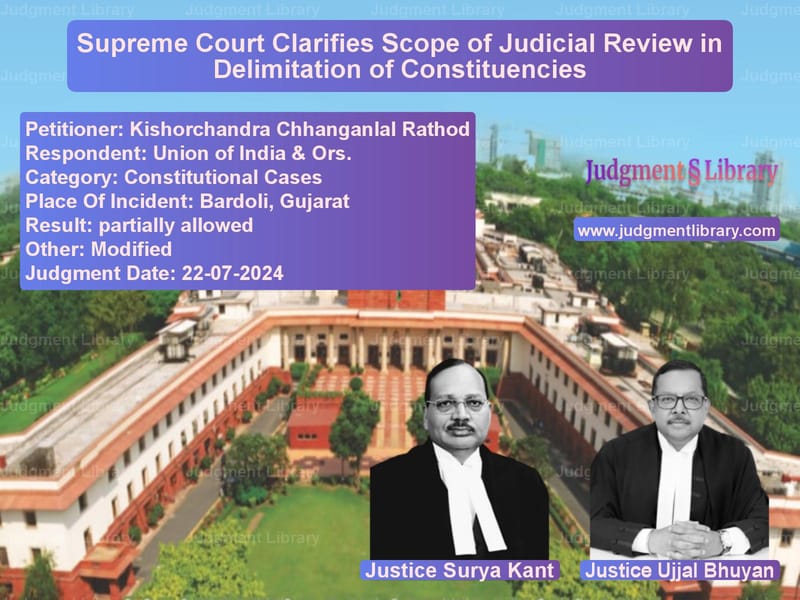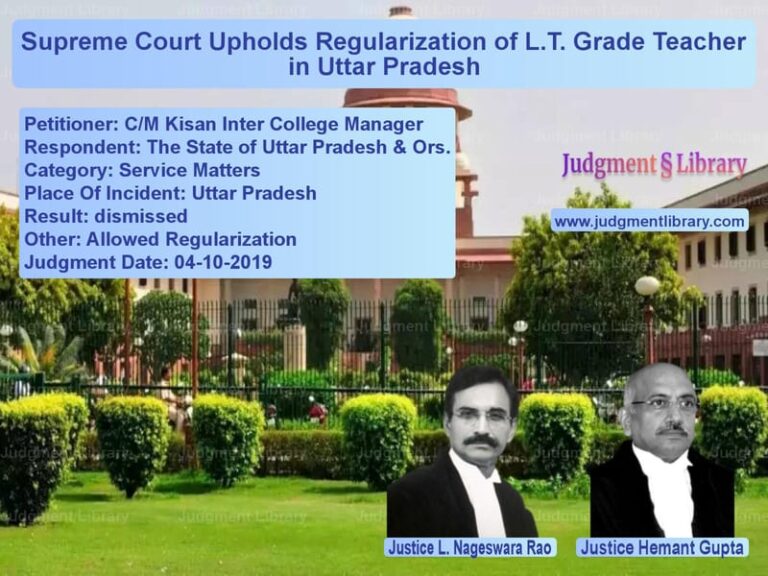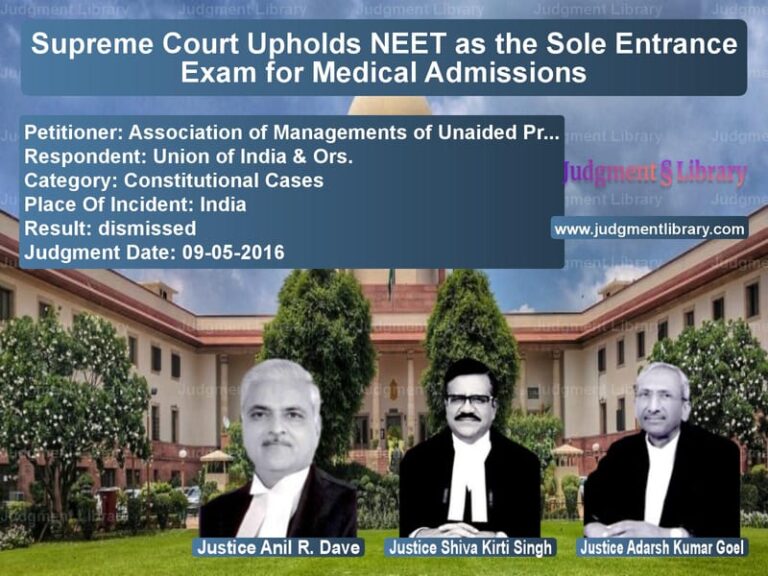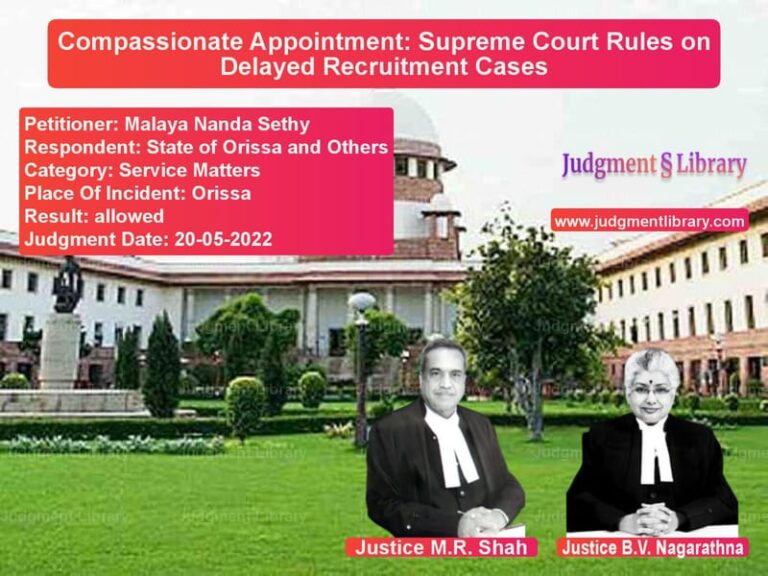Supreme Court Clarifies Scope of Judicial Review in Delimitation of Constituencies
The Supreme Court of India, in its judgment dated July 23, 2024, delivered an important ruling on the scope of judicial review in delimitation exercises. The case, Kishorchandra Chhanganlal Rathod vs. Union of India & Ors., arose from a challenge to the reservation of the Bardoli Legislative Assembly Constituency in Gujarat for Scheduled Caste (SC) candidates, as per the Delimitation Act, 2002. The Court partially allowed the appeal, holding that while judicial intervention in delimitation matters is limited, it is not entirely barred.
Background of the Case
The appellant, Kishorchandra Chhanganlal Rathod, filed a writ petition in the Gujarat High Court in 2012, challenging the delimitation exercise that resulted in the reservation of Bardoli constituency for Scheduled Caste candidates. The Gujarat High Court dismissed the writ petition, citing Article 329(a) of the Constitution, which bars courts from questioning the validity of laws related to the delimitation of constituencies.
Key Issues in the Appeal
- Whether the High Court correctly held that judicial review is entirely barred in delimitation matters.
- Whether the appellant’s challenge to the Delimitation Commission’s order was valid.
- Whether the Supreme Court could interfere in a delimitation exercise conducted in 2006.
Arguments by the Appellant
The appellant argued that:
- The Delimitation Commission’s order violated constitutional principles and was arbitrary.
- The High Court wrongly interpreted Article 329(a) as an absolute bar on judicial review.
- If judicial review is entirely barred, citizens would have no legal remedy to challenge arbitrary delimitation decisions.
- The Supreme Court, as the guardian of constitutional rights, must allow limited judicial scrutiny of delimitation exercises.
Arguments by the Respondents
The Union of India and the Delimitation Commission contended that:
- Article 329(a) of the Constitution expressly prohibits courts from questioning delimitation orders.
- The delimitation of Bardoli was completed in 2006, and significant time had passed since then.
- The High Court correctly dismissed the petition as the challenge was belated and barred under the constitutional scheme.
- The Delimitation Act, 2002, provides no mechanism for challenging final orders of the Commission in courts.
Supreme Court’s Observations
1. Judicial Review Is Limited, Not Completely Barred
The Supreme Court disagreed with the High Court’s blanket interpretation of Article 329(a). The Court held:
“Although Article 329 undeniably restricts judicial scrutiny of delimitation matters, it cannot be interpreted as a complete bar in all situations. If judicial intervention were entirely prohibited, citizens would have no forum to seek redress against arbitrary or mala fide actions of the Delimitation Commission.”
The Court cited its earlier rulings in Dravida Munnetra Kazhagam v. State of Tamil Nadu (2020) and State of Goa v. Fouziya Imtiaz Shaikh (2021), where it had held that judicial review is permissible in cases of manifest arbitrariness, mala fides, or constitutional violations.
2. Delimitation Orders Are Generally Final
The Court reaffirmed that once delimitation orders are published in the Gazette of India, they attain the status of law and cannot be ordinarily questioned in courts. However, it noted:
“If an order is manifestly arbitrary and irreconcilable with constitutional values, the courts may intervene to rectify the situation.”
The Court referred to Meghraj Kothari vs. Delimitation Commission (1966), which upheld the finality of delimitation orders but clarified that judicial review could be exercised in exceptional cases.
3. Delayed Challenge to the 2006 Delimitation Exercise
Despite recognizing the limited scope of judicial review, the Court declined to interfere in the present case, observing that:
- The delimitation exercise in question was completed in 2006, and multiple elections had taken place since then.
- Any interference now would disrupt the electoral process and create uncertainty in legislative representation.
- The appellant had not demonstrated exceptional circumstances warranting judicial intervention.
Final Judgment
- The appeal was partially allowed.
- The Court set aside the Gujarat High Court’s ruling to the extent that it held judicial review in delimitation matters is entirely barred.
- However, the Court declined to interfere with the Bardoli constituency’s delimitation and reservation, as it was conducted in 2006 and had since been implemented.
- The appellant was granted liberty to approach the High Court for any fresh delimitation-related issues arising from subsequent exercises.
Key Takeaways
- Judicial Review in Delimitation Matters: The Supreme Court clarified that while judicial review in delimitation cases is limited, it is not completely barred.
- Finality of Delimitation Orders: Once a delimitation order is published, it generally attains the status of law and cannot be challenged in courts.
- Delayed Challenges Are Not Entertained: The Court emphasized that petitions challenging old delimitation orders will not be entertained unless exceptional circumstances exist.
- Legal Remedies for Citizens: The ruling ensures that citizens retain some scope for judicial intervention if they can establish arbitrariness, mala fides, or constitutional violations.
Conclusion
The Supreme Court’s ruling strikes a balance between electoral stability and the need for judicial oversight in cases of unconstitutional delimitation. By clarifying that courts can intervene in cases of manifest illegality, the judgment safeguards the rights of citizens while preserving the finality of electoral processes.
Petitioner Name: Kishorchandra Chhanganlal Rathod.Respondent Name: Union of India & Ors..Judgment By: Justice Surya Kant, Justice Ujjal Bhuyan.Place Of Incident: Bardoli, Gujarat.Judgment Date: 22-07-2024.
Don’t miss out on the full details! Download the complete judgment in PDF format below and gain valuable insights instantly!
Download Judgment: kishorchandra-chhang-vs-union-of-india-&-ors-supreme-court-of-india-judgment-dated-22-07-2024.pdf
Directly Download Judgment: Directly download this Judgment
See all petitions in Fundamental Rights
See all petitions in Constitution Interpretation
See all petitions in Legislative Powers
See all petitions in Public Interest Litigation
See all petitions in Judgment by Surya Kant
See all petitions in Judgment by Ujjal Bhuyan
See all petitions in partially allowed
See all petitions in Modified
See all petitions in supreme court of India judgments July 2024
See all petitions in 2024 judgments
See all posts in Constitutional Cases Category
See all allowed petitions in Constitutional Cases Category
See all Dismissed petitions in Constitutional Cases Category
See all partially allowed petitions in Constitutional Cases Category







